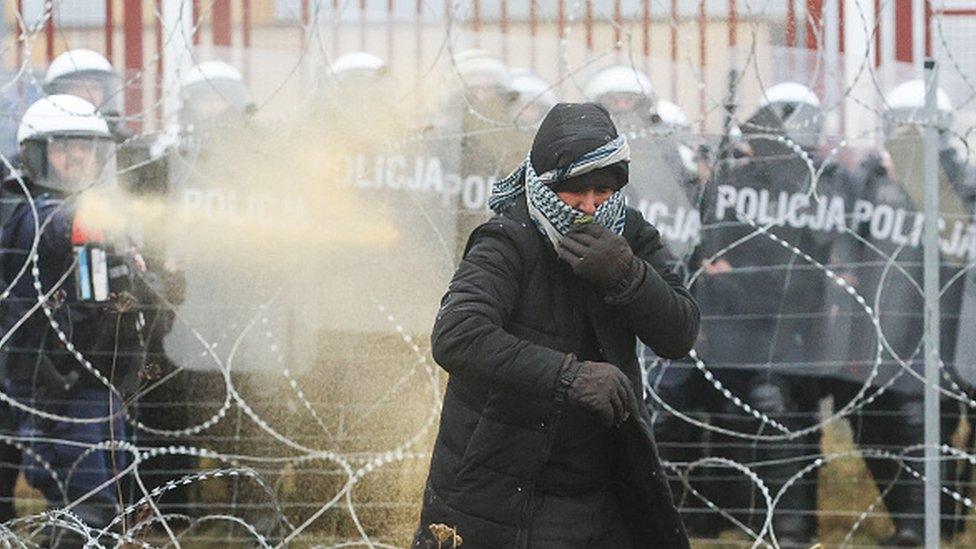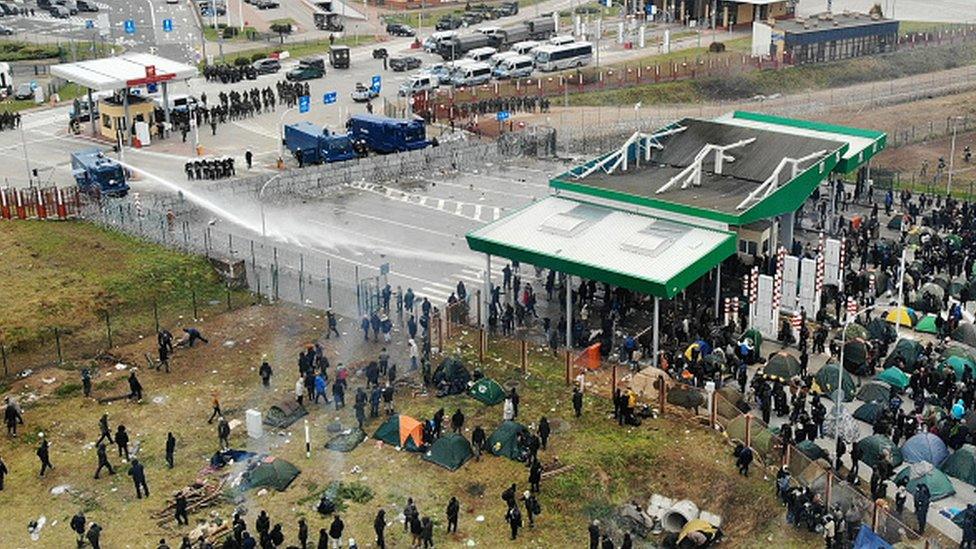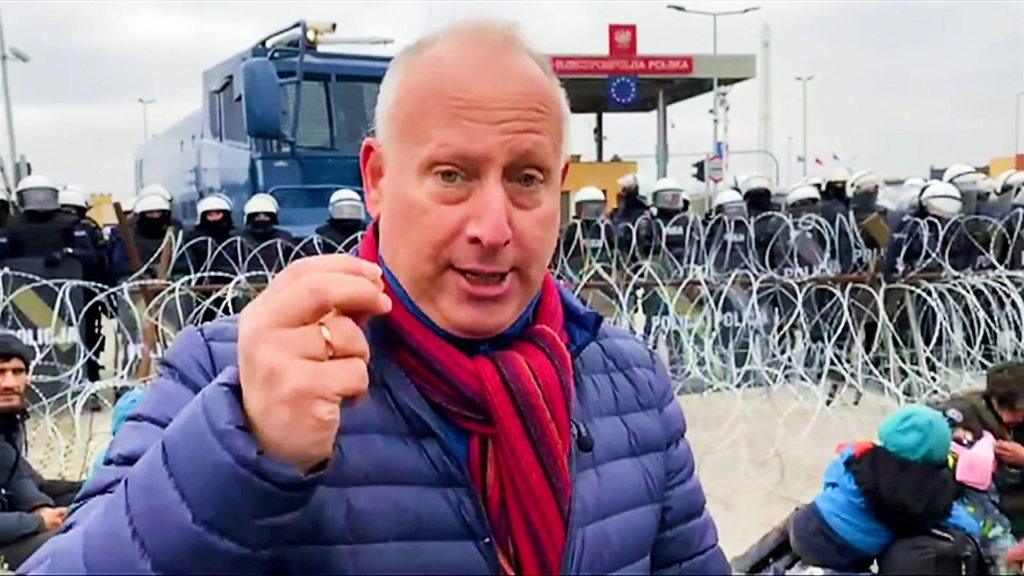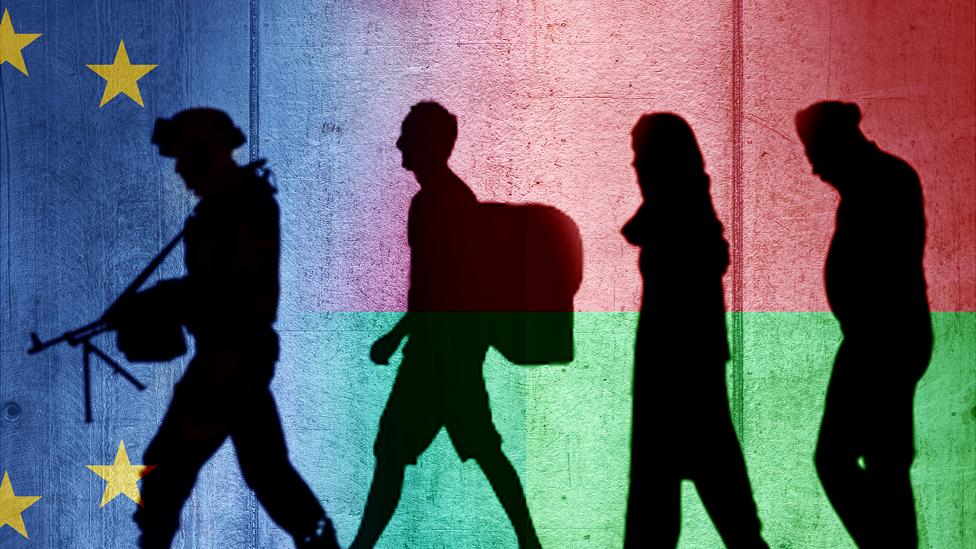Poland border crisis: Migrants tear-gassed trying to cross from Belarus
- Published
Watch the BBC's Steve Rosenberg at the scene of the chaos as water cannon and tear gas is used
Polish forces have used tear gas and water cannon against migrants trying to cross into the country from Belarus.
Videos showed migrants throwing stones and other objects at the Polish forces guarding a fortified border crossing.
For weeks, thousands of migrants, mostly from the Middle East, have been gathering at the Belarus border in an attempt to reach the European Union.
Belarus has been accused of pushing migrants to the border to try to destabilise the EU, a charge it denies.
EU-Belarus relations have been severely strained since long-term leader Alexander Lukashenko declared victory in a discredited presidential election last year and tried to silence dissent by cracking down on mass protests and arresting political opponents.
The EU imposed sanctions on Belarus in the wake of the poll and, along with the US, will step them up following the border crisis.
There have been more than 5,000 attempts by migrants to cross the border into Poland from Belarus so far this month, compared to just 88 in the whole of last year, the Polish border agency says.
REALITY CHECK: What routes do migrants use to reach Minsk?
BEHIND THE SCENES: How social media posts fuelled the Belarus crisis
The migrants, including children, have been living in makeshift camps in freezing conditions just inside Belarus. In recent days, thousands have converged on a crossing at Kuznica, south of Grodno in north-west Belarus.
On Monday, many of those migrants burst through a fence and gathered at a crossing on the Belarusian side of the border. They were blocked by Polish troops and a tense stand-off ensued.
By Tuesday morning, Poland's defence ministry said its forces had responded to migrants attacking a border fence at Kuznica.
"The migrants attacked our soldiers and officers with stones and are trying to destroy the fence and get to Poland. Our services used tear gas to quell the migrants' aggression," the ministry tweeted.

Tension at the Kuznica crossing has been growing in recent days

Polish police said one officer had been severely injured by a missile thrown across the border
Polish police said an officer was seriously injured by an object thrown across the border and was in hospital with a suspected fractured skull.
The police accused Belarusian forces of supplying migrants with stun grenades and standing by while they threw them and other missiles.
But Russia - a close ally of Belarus - condemned Poland's use of tear gas and water cannons against the migrants, calling it "absolutely unacceptable".
A BBC reporter at the scene described his eyes stinging from the use of tear gas, adding that the migrants had been unable to breach the border.

An image Belarus wants to transmit

Polish water cannon are being deployed because, here on the Belarusian side of the border, migrants started throwing rocks, bricks and branches towards the Polish forces.
It's a scene of chaos which is continuing. It feels very much like a pre-planned provocation. It seems as if a decision has been taken on this side of the border to try and exact a response from Poland, and from the EU.
This image is very much what Alexander Lukashenko wants to transmit to the world. Belarus has been trying to portray Europe as uncaring and uncompassionate, inhuman even. And certainly Belarus will use this to portray that image of Europe to the world.

The trouble at the border came just as there were signs of de-escalation.
Mr Lukashenko spoke to Germany's Angela Merkel on the phone on Monday, his first call since cracking down on protesters after the election.
He told a government meeting that "we cannot let this so-called problem lead to heated confrontation," state news agency Belta reported. Belta said Mr Lukashenko and Mrs Merkel agreed on further contacts to resolve the situation.
The call came after EU foreign ministers agreed to widen sanctions against Mr Lukashenko's government. The exact details will be confirmed later this week, but individuals and travel companies implicated in the movement of people through Belarus are expected to be affected.
Iraq has said it will repatriate its citizens, starting with a flight carrying 200 people on Thursday. But many migrants say they are determined to stay and enter the EU.
Related topics
- Published15 November 2021

- Published22 October 2021
